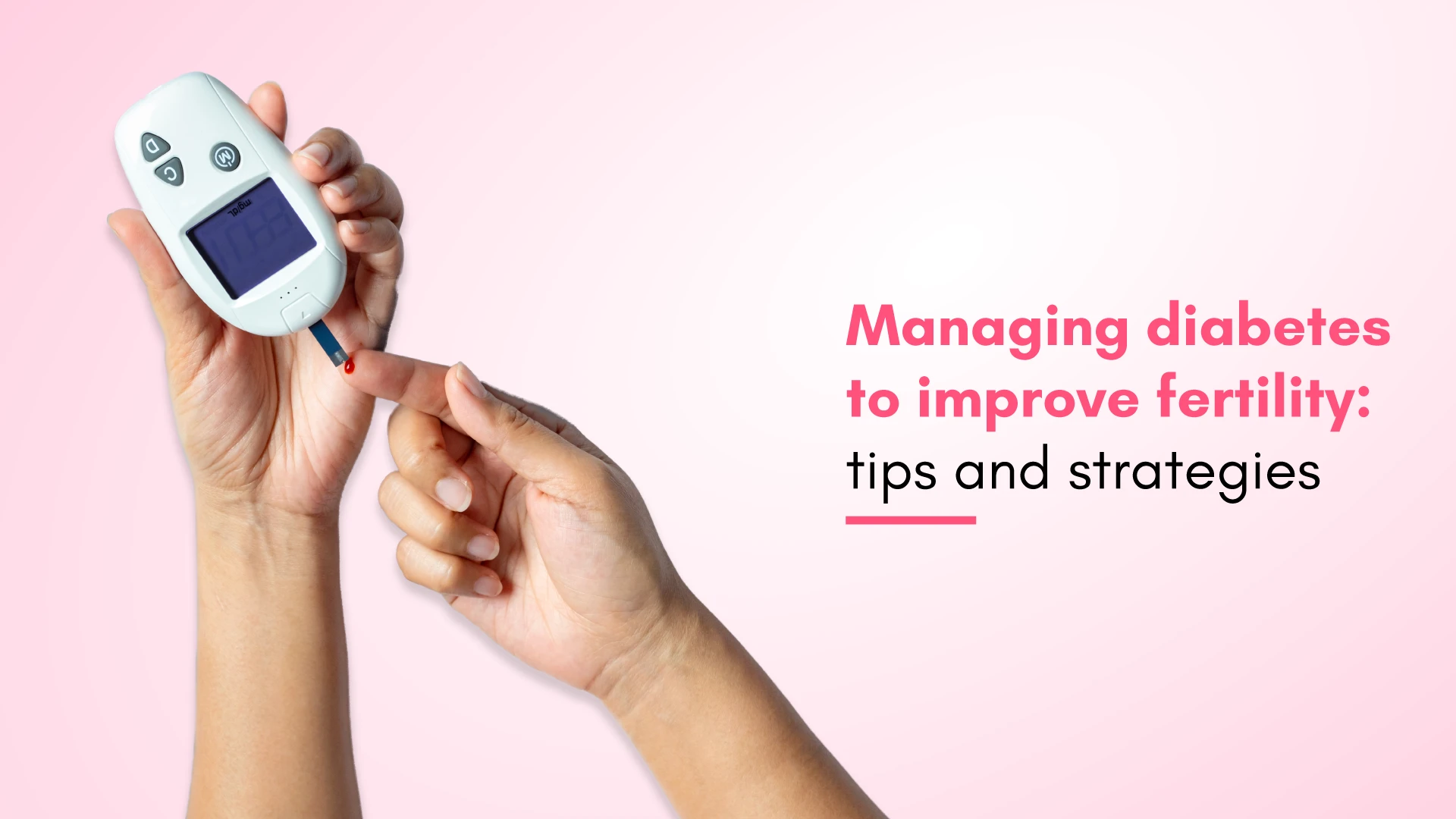Are you juggling diabetes management while dreaming of parenthood? Managing diabetes to enhance fertility isn’t just about numbers—it’s about finding a balance that supports your journey towards starting a family. Let’s explore practical strategies tailored to your lifestyles, helping you understand the impact of diabetes on fertility and empowering you to make informed choices for a healthier, happier future.
Understanding Diabetes and its Types
A chronic condition that impacts the body’s regulation of blood sugar (glucose), which is an essential energy source for your cells is called diabetes. In diabetes, there’s a problem with insulin secretion, a hormone produced by your pancreas necessary for the regulation of blood sugar.
There are three main types of diabetes:
- Type 1 Diabetes: An autoimmune condition (5-10% of cases) where the body attacks insulin-producing cells. It’s often diagnosed in childhood or young adulthood.
- Type 2 Diabetes: The most common type (90-95% of cases), it develops when the body resists insulin or doesn’t produce enough. Risk factors include family history, obesity, and inactivity.
- Gestational Diabetes: High blood sugar during pregnancy (2-10% of pregnancies) occurs, usually between 24-28 weeks. It typically resolves after childbirth.
Understanding these distinctions is crucial for managing diabetes effectively while striving to enhance fertility.
Impact of Diabetes on Fertility
Diabetes can impact fertility in both men and women, but the good news is that well-controlled blood sugar significantly improves your chances of conceiving. Here’s how diabetes can impact fertility:
- Hormonal disruption: Uncontrolled blood sugar disrupts hormones crucial for ovulation and sperm production.
Suggested Read: Role of Hormones in Fertility
- Reduced sperm/egg quality: High blood sugar can harm sperm and eggs, impacting fertilization and implantation.
- Sexual dysfunction: Diabetes can lead to erectile dysfunction and decreased libido.
Lifestyle Modifications to Improve Fertility with Diabetes
Living with diabetes doesn’t have to hinder your fertility journey. Here are some key lifestyle modifications to improve your chances of conception:
- Regular activity is key: Aim for at least 30 minutes of moderate-intensity exercise or physical activity on most days of the week. It improves the diabetes level during pregnancy and boosts overall health.
- Variety is good: Consider activities you enjoy, like brisk walking, swimming, cycling, or yoga.
- Consult your doctor: Discuss your exercise plans with your doctor to ensure they help with your diabetes management.
- Manage sleep: Aim for 7-8 hours of quality sleep each night. Adequate sleep can improve blood sugar regulation and overall health.
- Weight management: Excess weight can worsen insulin resistance and hormonal imbalances, impacting fertility. Hence, achieving and maintaining a healthy weight is crucial. Combine a balanced pregnancy-diabetes diet with regular exercise to manage your weight effectively.
Remember, consistency is key! These changes in lifestyle can help you create a healthier environment for both your current life and your potential future for a successful pregnancy with type 2 diabetes.
Suggested read:
Lifestyle Options to support female infertility treatment
Boosting Naturally Male Fertility with Diet, Lifestyle Changes
Medication Management and Fertility
Managing diabetes medications is crucial for optimizing fertility. Hence, consult with your healthcare provider to ensure your medication regimen supports your reproductive goals. Some diabetes medications may need adjustments to minimize their effects on fertility and ensure safe use during conception and pregnancy. Balancing the diabetes level for pregnancy with the right medications can positively impact reproductive health outcomes.
Monitoring Blood Sugar Levels for Optimal Fertility
Continuously monitoring your blood sugar levels is crucial for enhancing fertility in individuals with diabetes. Stable blood sugar supports healthy egg and sperm development, regulates ovulation cycles, and improves embryo implantation. Effective strategies include:
- Regular HbA1c tests for long-term control
- Daily blood glucose monitoring with a glucometer
- Consider Continuous Glucose Monitoring (CGM) systems if suitable
Nutritional Strategies to Support Fertility with Diabetes
Boosting pregnancy with diabetes starts on your plate. Here’s how to eat your way to better health:
- Balanced diet: Focus on whole grains, lean proteins, fruits, and vegetables. These foods stabilize blood sugar and support overall health.
- Healthy fats: Incorporate sources like avocados, nuts, and olive oil. These fats support hormone production and fertility.
- Limit sugar and refined carbs: Avoid foods that spike the diabetes level for pregnancy, such as sweets and white bread.
- Stay hydrated: Increase water consumption to help manage the diabetes level during pregnancy and support bodily functions.
Eating well is a delicious step towards your fertility goals!
Managing Stress and Mental Health for Fertility
Addressing stress and mental health is crucial for improving fertility outcomes. Techniques such as mindfulness and deep breathing can help reduce stress levels. Seeking support from counselors or participating in support groups can also provide emotional relief. Prioritizing self-care and maintaining a positive outlook can significantly enhance your fertility journey while managing diabetes in pregnancy effectively.
Suggested read: The Impact of Stress on Fertility
Medical Treatments and Assisted Reproductive Technologies (ART)
When diabetes complicates your fertility journey, there are medical treatments and ART options to consider:
- Fertility medications: These can stimulate ovulation and improve reproductive health.
- Intrauterine Insemination (IUI): A procedure where sperm is introduced into the woman’s uterus, increasing the chances of fertilization.
- In Vitro Fertilization (IVF): Eggs are fertilized outside the body, in a laboratory, and implanted in the uterus.
These medical interventions offer hope and potential solutions for couples facing fertility challenges.
Partner Support and Communication
Open communication with your partner is crucial when managing diabetes and fertility. Support from your partner can reduce stress and enhance emotional well-being, improving your overall fertility journey. Discussing treatment plans, lifestyle changes, and emotional challenges together fosters a supportive environment that strengthens your partnership and increases your chances of achieving conception.
Suggested Read: Supporting Your Partner Through The Challenges of Infertility
Fertility Specialists and Diabetes: Working Together for Success
Collaboration between fertility specialists and diabetes experts is crucial for optimizing reproductive outcomes and the diabetes level during pregnancy. They coordinate preconception planning to ensure diabetes management aligns with fertility goals. This partnership includes adjusting medications, monitoring blood sugar levels, and addressing any pregnancy complications with diabetes. By integrating expertise, they enhance the chances of a healthy pregnancy and a successful conception.
Conclusion
In conclusion, managing the diabetes level while aiming for a successful pregnancy requires dedication and a proactive approach. By implementing lifestyle changes, working closely with healthcare specialists, and prioritizing your health, you can significantly improve your chances of conceiving. For expert guidance tailored to your needs for pregnancy planning, consider consulting with Ferty9, a trusted fertility clinic committed to supporting couples on their journey from hope to happiness. Take the first step towards a brighter future for you and your family.





























